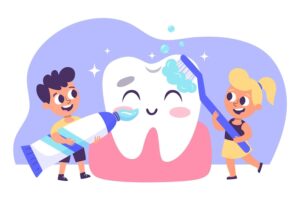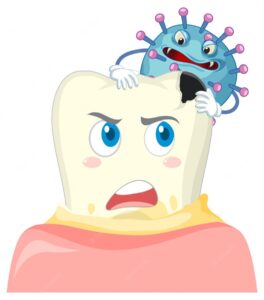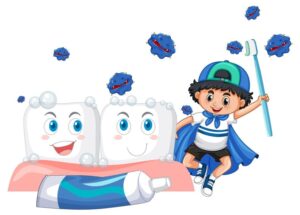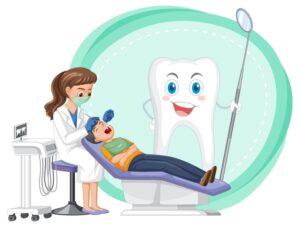
Building Healthy Teeth Habits for Children: Tips and Essential Information
Healthy teeth are essential for your child’s overall wellness. They assist your child in eating and talking. Strong oral hygiene helps your child develop good dental habits as he or she grows. Poor oral hygiene might result in infection, illness, or other dental issues. This blog will explore healthy teeth habits for children.
Here are some tips for making dental hygiene fun:
- Let children select their own toothbrushes. Depending on their interests, they can select one based on a favorite color or character.
- It is a good idea to let children choose toothpaste. The flavors can be chosen by the children.
- Learn about dental hygiene by reading books or watching videos. This will help to create healthy teeth habits for children.
- You can use a timer to make sure your children brush their teeth for two minutes. It may also be helpful to play their favorite song to help them keep track of time.
- Reward children for taking good care of their teeth. Food and sugary treats should not be given to them. Replace it with something healthy or simple, such as apple slices or a gold star.
- Follow up your child’s dentist appointment with a fun activity.
Taking steps to improve Dental health
Fluoride’s role
You should give your child fluoride to keep his or her teeth healthy. It reduces cavities in baby teeth (primary teeth) and permanent teeth. In addition, it strengthens teeth by hardening their enamel. The majority of children get fluoride from drinking water. There are many cities that require fluoride in their tap water. Fluoride is not removed by water filters such as Brita. Reverse osmosis water filters should not be used.
You may need to give your child an oral fluoride complement if your water does not contain fluoride. Consult your doctor if your child needs this. When your child visiting the dentist, he or she will receive a fluoride varnish or a cleaning. Having too much fluoride in your child’s diet can lead to tooth stains and damage their health. Ensure your child does not swallow fluoride toothpaste or mouthwash. Make sure you follow all instructions when taking fluoride supplements.
The importance of brushing and flossing

It is important to start your child’s dental hygiene when he or she is a baby. Around the age of 1 or 2, you can start using a soft child-size toothbrush. The best way to keep your child’s teeth healthy is to brush them twice a day with water. A small amount of fluoride-free toothpaste can also be added. It is safe for your child to swallow this type of toothpaste. When your child is old enough to spit out toothpaste, switch to one that contains fluoride. Use only a small amount. Make sure your child spreads it between his or her teeth, gums, and tongue. Learn how to brush your child’s teeth properly from your doctor or dentist.
Until your child is 7 or 8 years old, they may require help brushing their teeth. By this time, they can use a toothbrush of a larger size. The bristles of your toothbrush should be replaced every three to six months or when they start to wear down. It is recommended that children brush their teeth for two minutes. In addition to brushing, flossing is another essential part of your child’s oral care regimen. At least once a day, teach your child to floss. There are flosses that come with handles for easier handling.
You should also instruct your child to brush his or her teeth after eating. This aids in the reduction of microorganisms in the mouth.
Assure that your child understands the need of brushing his or her teeth before going to bed, after all eating and drinking has been completed.
Cavities
A cavity is a hole that forms in your teeth. They can be caused by a buildup of bacteria (germs) in the mouth. Food and drinks containing sugar can turn into acid, which erodes your teeth. Children’s teeth can be difficult to brush, which can lead to cavities. It is important that everyone in your family takes good care of their teeth. Those who have cavities can pass the cavity-causing bacteria on to unborn babies, infants, and children.

Cavities may be a risk for your child if they:
- Their teeth are white or brown in color.
- Health care needs that require ongoing attention.
- Avoid going to the dentist too often.
- Were born untimely or with a low birth weight.
Diet
Children who consume a mass of sugary foods and drinks are also at a high risk for cavities, this is not a healthy teeth habits for children. Choosing healthy foods is important. Sugar should be consumed in moderation. Keep your child away from soda, fruit juice, and sweetened drinks. Drinks and snacks that contain sugar should be limited between meals. After your child consumes sugar, make sure they brush their teeth. It is safe for older kids to chew gum.
The following are some of the benefits it can provide:
- Jaw strengthening.
- Assists in saliva production.
- Getting rid of food scraps.
- Acids that cause tooth decay must be balanced.
- Freshening your breath.
Sugary gum, on the other hand, can create cavities. Limit your child’s sugar gum consumption or exclusively offer them sugar-free gum.
Safety of the mouth
Another important aspect of oral hygiene is safety. If your child participates in sports, he or she should wear a mouth guard. This is a soft, plastic servant that covers the teeth and the lips. It aids in the protection of your child’s mouth from damage. If you require a custom-fit mouth guard, consult your dentist.

From baby teeth to adult teeth
Baby teeth appear between the ages of 4 and 7 months. The two bottom front teeth are usually the first to appear. Most children have all 20 baby teeth by the age of three.
Children might lose their baby teeth as young as six years old and as old as twelve. During this time, your child will have a mixture of teeth as baby teeth fall out and adult teeth burst through. Around this time, your dentist may discuss potential tooth problems with you and your child. Some children require orthodontic treatment, such as braces. A complete set of adult teeth consists of 32 teeth. This includes wisdom teeth, which majority people do not get until they are in their late teens or early twenties.
Consider the following:
Babies suck their thumbs, fingers, or pacifiers all the time. Most youngsters outgrow this tendency by the age of four. Prolonged use can result in tooth alignment issues. If your child is still sucking after the age of four, consult with your dentist. They can keep an eye out for issues as your child’s teeth develop. Most youngsters do not need to be concerned about a sucking habit until they reach the age of six, when their permanent front teeth appear.
When should you visit the dentist?
Children should see a dentist around their first birthday, according to the American Academy of Pediatric Dentistry (AAPD). This allows the dentist to detect early abnormalities with your child’s teeth. Pediatrics dental specialist are master in the care of children’s teeth. The dentist will advise you on proper oral hygiene.

Taking your child to the dentist at an early age will make him or her more comfortable. It also instills the importance of frequent dental checks. Everyone should visit the dental surgeon at least twice a year.
If you see any of the following symptoms, contact your dentist straight away:
- Your child is experiencing tooth discomfort or has a tooth or mouth infection.
- There has been a permanent tooth extraction for your child. If you discover the tooth, place it in milk and bring it with you to the dentist. They might be able to reconnect it.
What to Ask Your Doctor?
- Is my child required to take fluoride pills orally?
- What type of toothbrush is suitable for my child?
- Is mouthwash safe for my child?
- Is my child at high risk of cavities?
- How frequently should my child go to the dentist?
- Is it safe for my child to have dental X-rays?
- Is it okay for my child to chew gum?

Most Commented